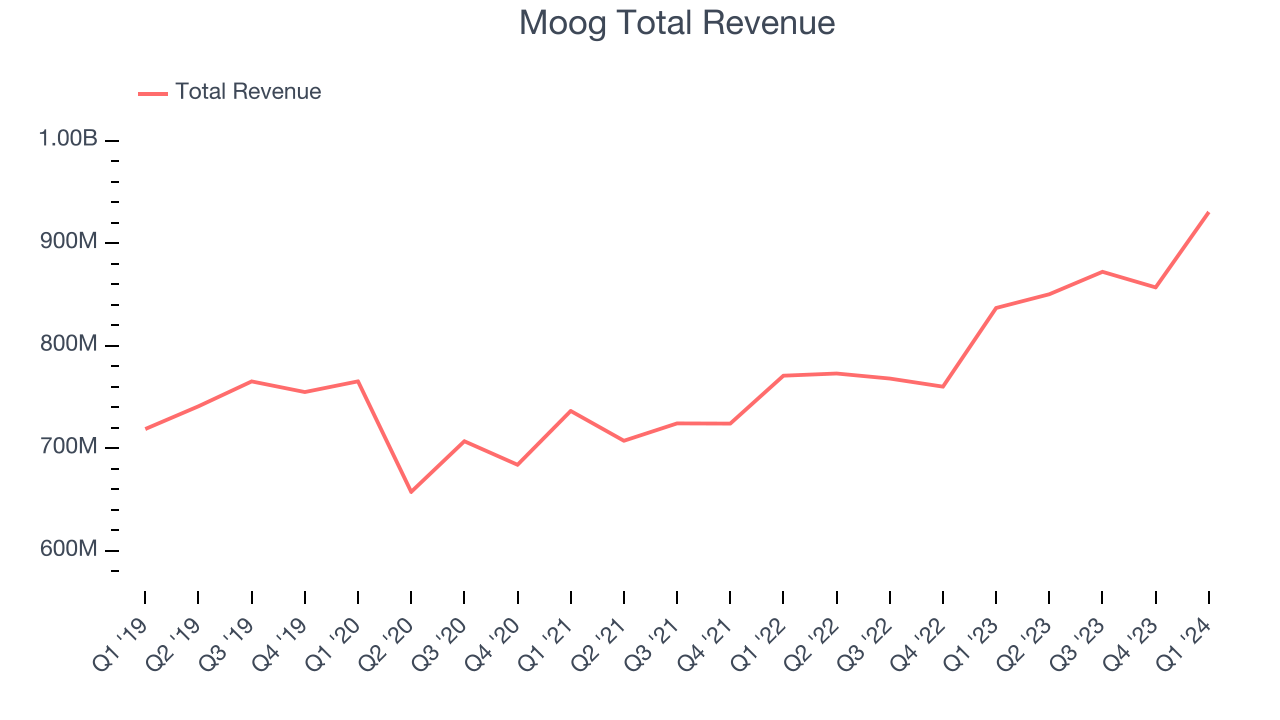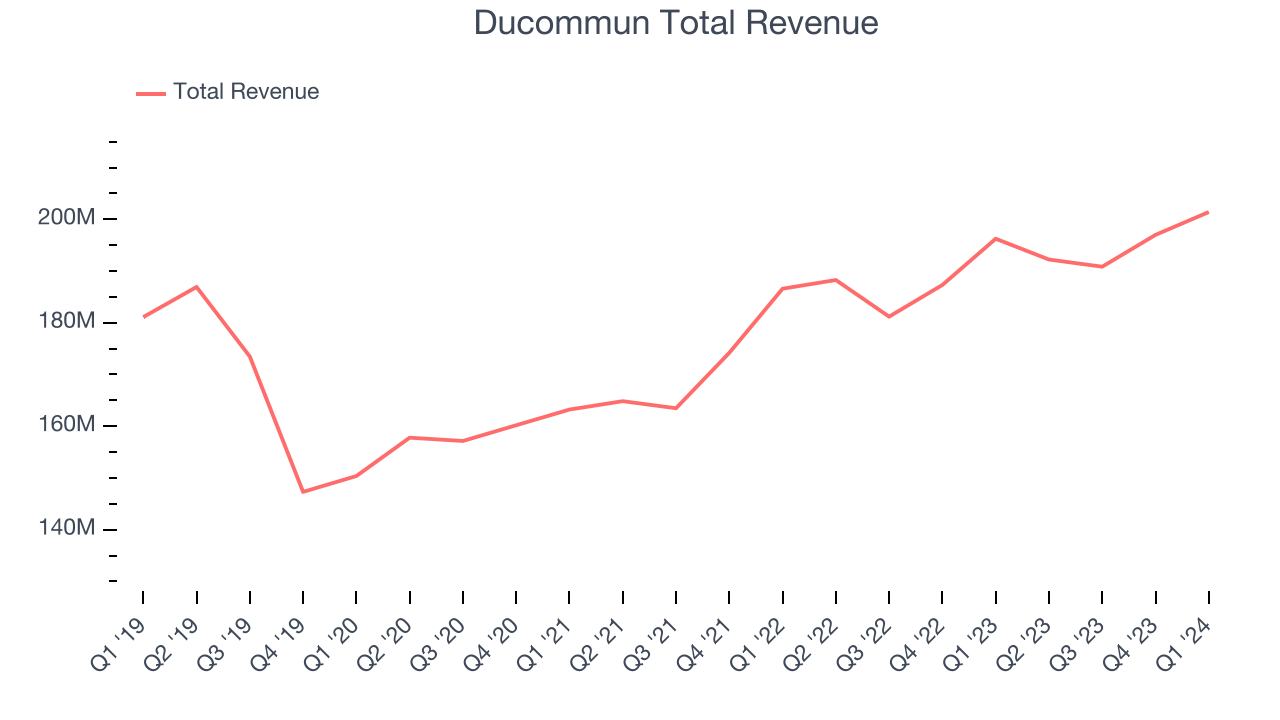
Looking back on aerospace stocks’ Q1 earnings, we examine this quarter’s best and worst performers, including Moog (NYSE: MOG.A) and its peers.
Aerospace companies often possess technical expertise and have made significant capital investments to produce complex products. It is an industry where innovation is important, and lately, emissions and automation are in focus, so companies that boast advances in these areas can take market share. On the other hand, demand for aerospace products can ebb and flow with economic cycles and geopolitical tensions, which can be particularly painful for companies with high fixed costs.
The 15 aerospace stocks we track reported a mixed Q1. As a group, revenues were in line with analysts’ consensus estimates while next quarter’s revenue guidance was 2% above.
In light of this news, share prices of the companies have held steady as they are up 3.7% on average since the latest earnings results.
Moog (NYSE: MOG.A)
Responsible for the flight control actuation system integrated in the B-2 stealth bomber, Moog (NYSE: MOG.A) provides precision motion control solutions used in aerospace and defense applications
Moog reported revenues of $930.3 million, up 11.2% year on year. This print exceeded analysts’ expectations by 6.5%. Overall, it was an incredible quarter for the company with a solid beat of analysts’ EPS estimates and an impressive beat of analysts’ EBITDA estimates.

Moog achieved the biggest analyst estimates beat of the whole group. Unsurprisingly, the stock is up 35.5% since reporting and currently trades at $213.15.
Is now the time to buy Moog? Access our full analysis of the earnings results here, it’s free.
Ducommun (NYSE: DCO)
California’s oldest company, Ducommun (NYSE: DCO) is a provider of engineering and manufacturing services for high-performance products primarily within the aerospace and defense industries.
Ducommun reported revenues of $201.4 million, up 2.6% year on year, outperforming analysts’ expectations by 3.8%. The business had an incredible quarter with an impressive beat of analysts’ EPS estimates and a solid beat of analysts’ EBITDA estimates.

The market seems content with the results as the stock is up 2.3% since reporting. It currently trades at $66.87.
Is now the time to buy Ducommun? Access our full analysis of the earnings results here, it’s free.
Weakest Q1: Textron (NYSE: TXT)
Listed on the NYSE in 1947, Textron (NYSE: TXT) provides products and services in the aerospace, defense, industrial, and finance sectors.
Textron reported revenues of $3.43 billion, up 2.5% year on year, falling short of analysts’ expectations by 2.7%. It was a disappointing quarter as it posted full-year EPS guidance missing analysts’ expectations significantly.
As expected, the stock is down 2.7% since the results and currently trades at $84.50.
Read our full analysis of Textron’s results here.
Howmet (NYSE: HWM)
Inventing the first forged aluminum truck wheel, Howmet (NYSE: HWM) specializes in lightweight metals engineering and manufacturing multi-material components used in vehicles.
Howmet reported revenues of $1.84 billion, up 10.7% year on year. This result lagged analysts' expectations by 1%. Aside from that, it was a satisfactory quarter as it also logged an impressive beat of analysts’ adjusted operating income estimates and full-year revenue guidance meeting analysts’ expectations.
The stock is up 12.1% since reporting and currently trades at $114.49.
Read our full, actionable report on Howmet here, it’s free.
Astronics (NASDAQ: ATRO)
Integrating power outlets into many Boeing aircraft, Astronics (NASDAQ: ATRO) is a provider of technologies and services to the global aerospace, defense, and electronics industries.
Astronics reported revenues of $203.7 million, up 25% year on year. This result beat analysts’ expectations by 2.6%. Overall, it was a very strong quarter as it also produced an impressive beat of analysts’ EPS and EBITDA estimates.
The stock is down 20.9% since reporting and currently trades at $16.29.
Read our full, actionable report on Astronics here, it’s free.
Market Update
Thanks to the Fed's series of rate hikes in 2022 and 2023, inflation has cooled significantly from its post-pandemic highs, drawing closer to the 2% goal. This disinflation has occurred without severely impacting economic growth, suggesting the success of a soft landing. The stock market has thrived in 2024, spurred by recent rate cuts (0.5% in September and 0.25% in November), and a notable surge followed Donald Trump’s presidential election win in November, propelling indices to historic highs. Nonetheless, the outlook for 2025 remains clouded by potential trade policy changes and corporate tax discussions, which could impact business confidence and growth. The path forward holds both optimism and caution as new policies take shape.
Want to invest in winners with rock-solid fundamentals? Check out our Top 6 Stocks and add them to your watchlist. These companies are poised for growth regardless of the political or macroeconomic climate.
Join Paid Stock Investor Research
Help us make StockStory more helpful to investors like yourself. Join our paid user research session and receive a $50 Amazon gift card for your opinions. Sign up here.




